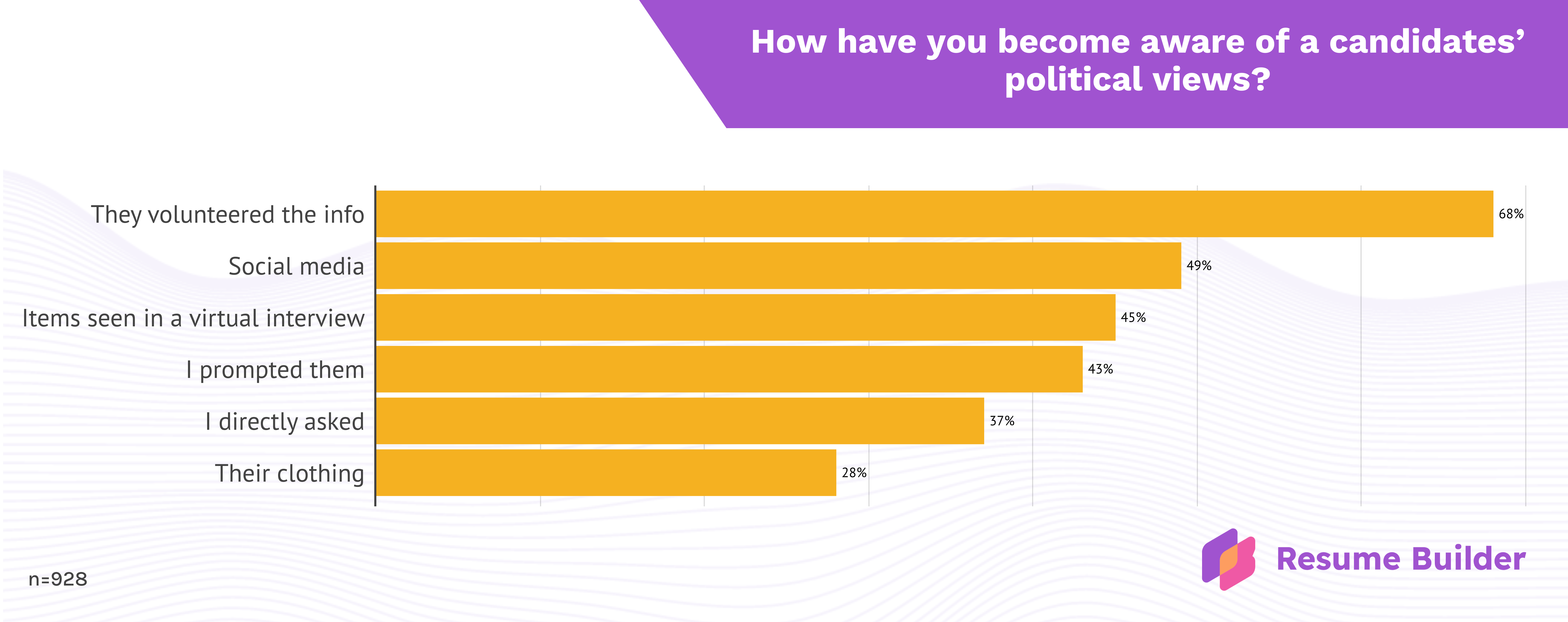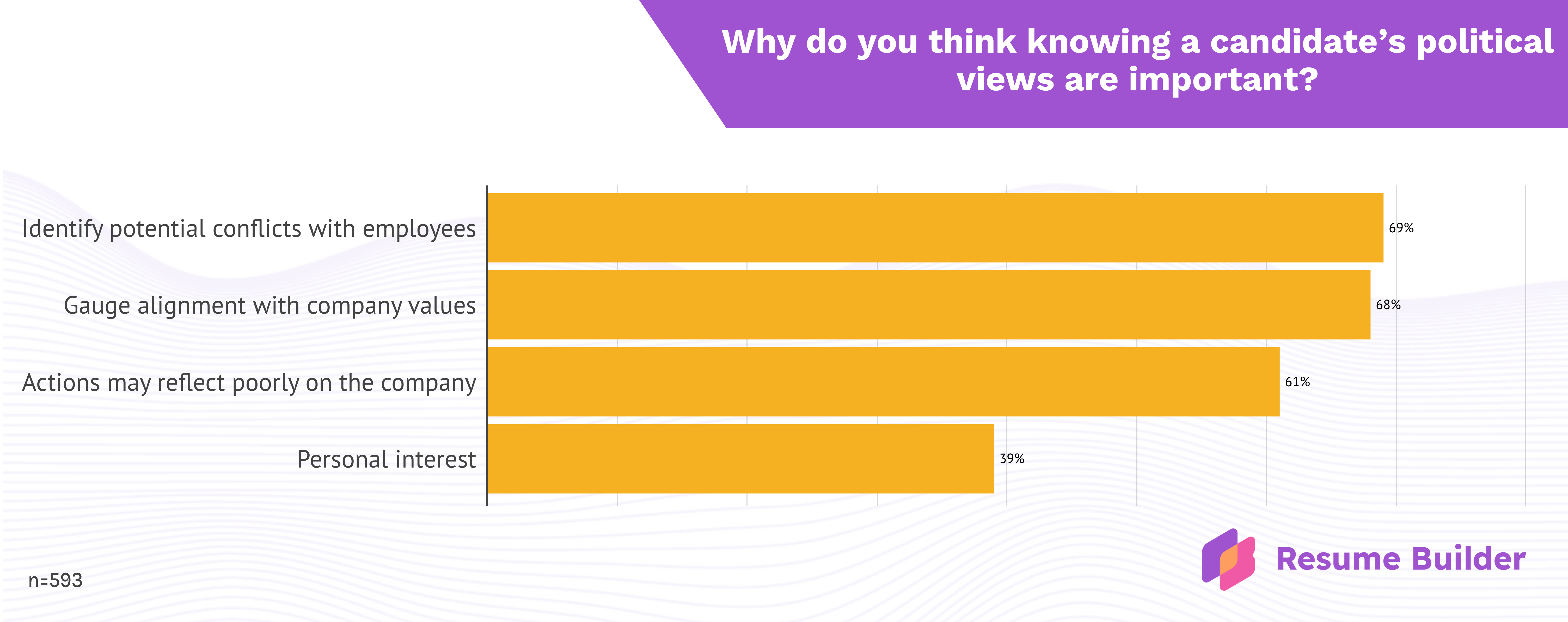As the 2024 U.S. presidential election draws near, political viewpoints continue to be an extremely divisive issue among all social groups. However, there are currently no federal laws prohibiting political bias in the hiring process, although individual states may have their own protections.
Given the current climate, we wanted to find out how many hiring managers take politics into consideration when making decisions on candidates. In August, ResumeBuilder.com surveyed 1,000 U.S.-based hiring managers to find out.
Key findings:
- Two-thirds of hiring managers typically know candidates’ political views; 68% of this group are likely to prioritize those with similar political views to their own
- 64% believe knowing a candidate’s political views is important
- 1 in 5 are unlikely to hire candidates with opposing views
68% of Hiring Managers Likely To Prioritize Hiring Candidates With Similar Views
Among the 93% of hiring managers who have had the experience of learning a candidate’s political views, 40% say they are very likely to prioritize candidates with similar political views to their own, and 28% are somewhat likely to do this. Also, 15% say they are somewhat unlikely to prioritize candidates with similar viewpoints, and 17% are very unlikely to do this.
When the 68% who say they are likely to favor candidates with similar politics were asked why, reasons included that the candidate’s potential actions would reflect well on the company (67%) and that they would be a better culture fit (64%).

Two-Thirds of Hiring Managers Typically Know Candidates’ Political Views; Half Say They Check Social Media
Of all hiring managers, 64% say they are almost always aware (35%) or sometimes aware (29%) of job candidates’ political views, while 14% are occasionally aware, 15% are almost never aware, and 7% are never aware.
Of those who have had this experience, the most common ways they became aware of a candidate’s politics include the candidate volunteering the information (69%), by checking the candidate’s social media (49%), and by items seen in a virtual interview, such as a poster or sticker (45%).
“It’s not surprising that so many hiring managers check candidates’ political affiliations during the hiring process, especially in today’s polarized environment,” says Stacie Haller, chief career advisor at ResumeBuilder.com. “Our findings align with previous surveys showing that a significant number of hiring managers also scrutinize social media and other outlets for clues about a candidate’s age, religion, or other personal characteristics that may introduce bias into the process.
“This practice is, of course, unacceptable, and political bias should be viewed with the same seriousness as any other form of bias. The increasing polarization of our society has forced us to confront these issues in the workplace more than ever before, making it essential to address and eliminate such discriminatory practices in hiring,” Haller says.

64% Believe Knowing a Candidate’s Political Views Is Important
Among the 93% of hiring managers who have had this experience, nearly two-thirds think knowing a candidate’s politics is very important (38%) or somewhat important (26%), while 22% say it is not very important, and 14% say not at all important.
For those who believe this is important, the reasons given include the ability to identify potential conflicts with existing employees (69%), to gauge alignment with company values (68%), and to anticipate actions that may reflect poorly on the company (61%).
“Using political beliefs as a criterion in hiring is just as problematic as basing decisions on age, religion, gender, or any other factor unrelated to a candidate’s qualifications,” says Haller. “In today’s increasingly polarized society, it’s crucial to acknowledge that this type of bias is no different from the others we’ve been striving to eliminate in the hiring process. Qualifications and skills should be the focus, not personal beliefs.”

1 in 5 Hiring Managers Are Unlikely To Hire Candidates With Opposing Political Views
For hiring managers who learn a candidate’s political views, 19% say they are somewhat unlikely (15%) or very unlikely (4%) to hire candidates with opposite political views. And 51% are very likely and 31% are somewhat likely to hire those with opposing politics.
Among the one in five unlikely to hire these candidates, reasons why include wanting to avoid potential actions that may reflect poorly on the company (75%) and to avoid a bad culture fit (73%).
Hiring managers voting for Trump had a slightly higher percentage of those unlikely to hire candidates with opposite views (17%) than hiring managers voting for Harris (12%).
“Some managers justify bringing their personal biases into the hiring process by claiming they want candidates who align with the company’s culture and can represent the organization accordingly,” continues Haller.
“However, companies are not officially affiliated with any political party, so using political alignment as a criterion appears to be more of an excuse to impose personal biases rather than a legitimate consideration for cultural fit.
“What complicates this issue further is when organizations do donate to political parties or causes, inadvertently creating a culture that reflects certain political beliefs. This may lead some managers to feel it’s important for employees to align with those views, even though such considerations should not influence hiring decisions. Ultimately, hiring should be based on a candidate’s qualifications and fit for the role, not their political affiliation,” Haller explains.
Methodology
This survey, launched in August 2024, was commissioned by ResumeBuilder.com and conducted online by the polling platform Pollfish. Overall, 1,000 participants completed the full survey.
To qualify for the survey, respondents had to meet the following criteria: 25 years of age or older, employed for wages, working at a company of 11 or more employees, earning a household income of at least $75,000 per year, a high school education or greater, and an organization role of owner or partner, president/CEO/chairperson, C-level executive, chief financial officer (CFO), chief technical officer (CTO), senior management, director, human resources manager, or supervisor. Additionally, respondents were screened to include only those highly involved in their company’s hiring process.
Media contacts may reach out to [email protected]
